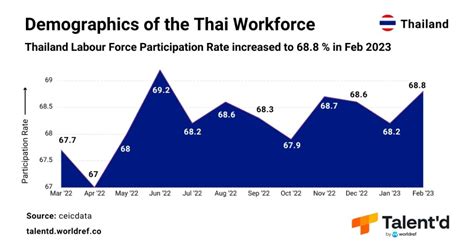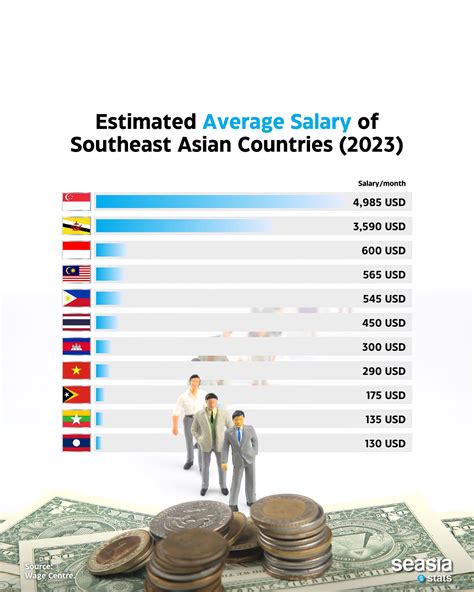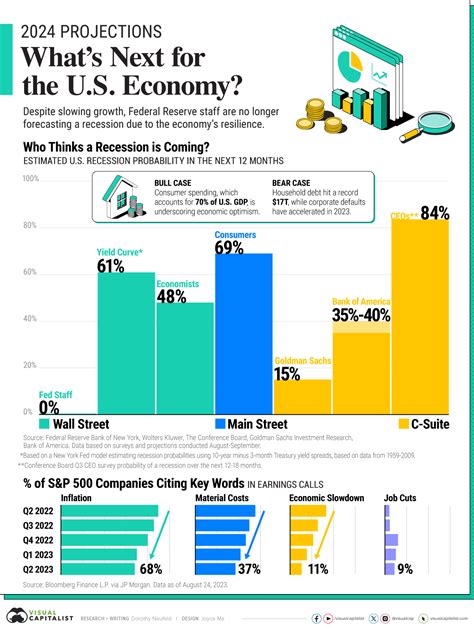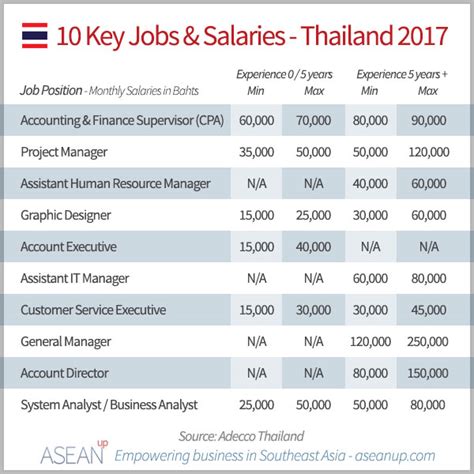Thailand, known for its vibrant culture and dynamic economy, is an increasingly attractive destination for both local and international professionals. But what can you realistically expect to earn? While the "Land of Smiles" offers a relatively low cost of living, understanding the salary landscape is crucial for anyone looking to build a career here.
This guide provides a data-driven look at the average salary in Thailand, exploring the key factors that determine your earning potential, from your industry and experience to where you choose to work.
Understanding the Thai Economy and Workforce

Before diving into the numbers, it's important to understand the context of Thailand's economy. Traditionally driven by agriculture, manufacturing (especially automotive and electronics), and tourism, the nation is undergoing a significant transformation. The "Thailand 4.0" initiative is a government-led push to transform the country into a high-income, value-based economy, focusing on technology, innovation, and creative industries.
This economic shift is creating a high demand for skilled professionals in sectors like Information Technology, FinTech, Digital Marketing, and advanced logistics, directly impacting salary trends across the country.
Thailand's Average Salary: The National Benchmark

When discussing a national average, it's essential to look at multiple sources to get a clear picture. This figure serves as a general benchmark, with individual salaries varying significantly.
According to Thailand's National Statistical Office (NSO), the average monthly wage for 2023 was approximately 27,350 Thai Baht (THB). However, salary data from professional recruitment agencies, which often focus on skilled, white-collar roles in urban centers, paints a different picture.
A comprehensive analysis of data from sources like the recruitment firm Robert Walters' 2024 Salary Survey and aggregators like Payscale suggests a broader range:
- Average Monthly Salary (Overall): 25,000 - 45,000 THB (~$680 - $1,220 USD)
- Typical Salary Range: 15,000 THB (entry-level, operational roles) to over 250,000 THB (executive-level, specialized roles).
The median salary is often a more accurate representation as it is less skewed by extremely high earners. While official median data is less common, professional estimates place it slightly lower than the average, around 25,000 THB per month.
Key Factors That Influence Salary

Your personal salary will be determined by a combination of factors. Understanding these levers is the key to maximizing your earning potential in the Thai job market.
###
Level of Education
Education remains a strong determinant of starting salaries and long-term career growth in Thailand. A higher academic qualification typically opens doors to higher-paying roles.
- High School Diploma: Often qualifies for entry-level service, administrative, or factory positions with salaries at the lower end of the national average (12,000 - 20,000 THB).
- Bachelor's Degree: This is the standard requirement for most professional and office-based roles. Graduates can expect starting salaries from 20,000 to 35,000 THB, depending on the field of study.
- Master's Degree/MBA: A postgraduate degree, especially from a reputable university, can significantly boost earning potential, particularly in fields like finance, management, and technology. It can command a starting salary 30-50% higher than a Bachelor's degree holder and is often a prerequisite for senior management positions.
###
Years of Experience
Experience is arguably the most critical factor in salary progression. Employers in Thailand place a high value on proven skills and a track record of success.
- Entry-Level (0-2 years): Professionals starting their careers can expect salaries in the 20,000 - 40,000 THB range, depending heavily on their industry and qualifications.
- Mid-Career (3-8 years): With several years of experience, professionals can expect to earn between 45,000 - 90,000 THB. This is the stage where specialization begins to significantly impact earnings.
- Senior/Managerial (8+ years): Senior professionals, team leads, and managers with substantial experience can command salaries well over 100,000 THB, with director and C-suite positions often exceeding 250,000 - 500,000 THB per month.
###
Geographic Location
Where you work in Thailand has a massive impact on your salary. The cost of living and concentration of businesses create significant regional disparities.
- Bangkok Metropolitan Region: As the economic and commercial heart of the nation, Bangkok offers the highest salaries, often 30-50% higher than in other regions. It is the hub for multinational corporations, tech companies, and financial institutions.
- Eastern Economic Corridor (EEC): This special economic zone (covering Chonburi, Rayong, and Chachoengsao) is a hub for advanced manufacturing, logistics, and automotive industries. Salaries here are competitive and second only to Bangkok, driven by high demand for engineers and skilled technicians.
- Major Provincial Cities: Cities like Chiang Mai and Phuket have strong tourism and growing tech scenes. Salaries are generally lower than in Bangkok but higher than in rural areas.
- Other Provinces: In more rural and agricultural provinces, wages are significantly lower and often align more closely with the national minimum wage.
###
Company Type
The type of company you work for is a major salary differentiator.
- Multinational Corporations (MNCs): MNCs typically offer the highest salary packages, superior benefits, and structured career paths. They compete for top talent on a global scale and often peg their salaries to international standards.
- Large Thai Corporations: Well-established local companies (e.g., in banking, telecommunications, or energy) offer competitive salaries that are often just below MNC levels but provide strong job security and cultural familiarity.
- Startups and SMEs: Salaries at small and medium-sized enterprises (SMEs) and startups can vary widely. While some tech startups offer competitive pay and stock options to attract talent, many SMEs offer more modest salaries.
###
Area of Specialization
Your industry and specific skill set are crucial. According to reports from Adecco and Robert Walters, high-demand fields command premium salaries.
- High-Paying Fields:
- Information Technology: Software Development, Cybersecurity, Data Science, and Cloud Engineering are in extremely high demand. Senior developers and data scientists can earn over 150,000 THB.
- Finance & Banking: Roles in investment banking, risk management, and FinTech are highly compensated.
- Executive Management: C-level positions (CEO, CFO, COO) in large corporations command the highest salaries in the country.
- Digital Marketing & E-commerce: Specialists in performance marketing, SEO, and e-commerce management are sought after as companies expand their digital footprint.
- Mid-to-Lower Paying Fields:
- Administration & Customer Service: These roles are essential but typically fall within the lower-to-mid range of the national average.
- Hospitality & Tourism: While a cornerstone of the economy, non-managerial roles in hotels and tourism often have lower base salaries, sometimes supplemented by service charges.
- General Manufacturing/Labor: Roles that do not require specialized technical skills tend to be at the lower end of the salary spectrum.
Economic Outlook and High-Demand Sectors

Unlike the U.S. BLS, Thailand's economic outlook is often tracked by entities like the World Bank and the National Economic and Social Development Council (NESDC). The outlook is one of steady recovery and strategic growth.
The Thai economy is projected to continue its post-pandemic growth, fueled by a rebound in tourism and sustained export performance. The "Thailand 4.0" initiative is the key driver of future job demand. Professionals should watch for opportunities in the following high-growth sectors:
- Digital Economy: AI, FinTech, E-commerce, and Software Development.
- Advanced Manufacturing: Automation engineering and robotics in the EEC.
- Health & Wellness: Healthcare technology and high-quality medical services.
- Sustainable Logistics: Green logistics and smart supply chain management.
This focus ensures that demand for skilled, tech-savvy professionals will remain strong, likely driving wage growth in these key areas faster than the national average.
Conclusion

Navigating the job market in Thailand requires understanding that the "average salary" is merely a signpost, not a destination. Your actual earning potential is a dynamic figure shaped by your unique combination of skills, experience, and strategic choices.
Key Takeaways:
- The Benchmark: The national average monthly salary hovers around 25,000-35,000 THB, but this figure is heavily influenced by lower-wage sectors.
- Maximize Your Factors: Higher education, specialized skills (especially in tech), and significant experience are your most powerful tools for commanding a higher salary.
- Location Matters: Working in Bangkok or the EEC will almost always result in a higher income than in other parts of the country.
- Aim for Growth Sectors: Aligning your career with Thailand's high-growth industries like the digital economy and advanced manufacturing will place you in the highest demand.
For anyone considering a career in Thailand, the opportunities are abundant. By focusing on continuous development and positioning yourself strategically, you can build a successful and financially rewarding career in this vibrant Southeast Asian hub.
